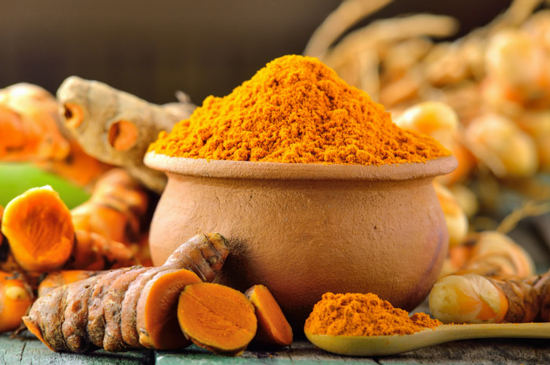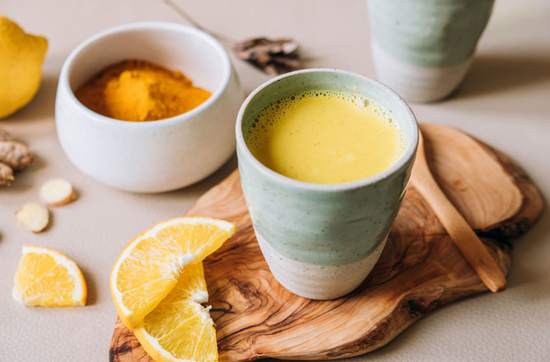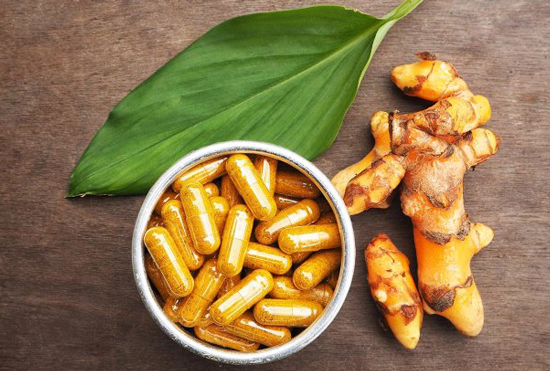The Top 10 Health Benefits of Turmeric: The Sacred Root that Rejuvenates the Body and Mind (1)

What Is Turmeric?
Used internationally as a staple spice in cuisine, an element of holistic medicine, an offering in religious ceremonies, and even a coloring in cosmetics, turmeric has been providing the world with countless uses and immense health benefits for thousands of years. The scientific name for the plant is Curcuma longa, a well-known perennial belonging to the ginger family of Zingiberaceae.
Turmeric’s beautiful bright yellow root has led to its nicknames “the golden spice” and “Indian saffron.” It has graced countless cultures around the world with its gorgeous coloring, unique aroma, and unmistakable flavor. Available in a natural state of the whole turmeric root or in powdered, pressed, extract or supplement forms, turmeric can provide countless preventative and healing measures.
A Brief History
Native to the southwest of India, turmeric root has been a staple of Ayurvedic medicine for more than 4,000 years. Turmeric benefits and usage has spread recently around the world to contribute to the healing and preventative medicinal applications of countless conditions. Around Ch.E. 700, the turmeric plant is thought to have arrived in China. The earliest record of the plant is in one of the first Ayurvedic scientific and medical documents, the Sanskrit text Compendium of Caraka (written between the fourth century B.Ch.E. and the second century Ch.E.), which recommended turmeric as an efficient remedy for food poisoning.
Turmeric became a staple of the culture and cuisine of India, where they utilized the root for multiple applications. People in India became such devout believers in the root’s healing and protective powers that they became planters and suppliers; India now produces more than 80 percent of the world’s turmeric root. With more than 3,000 studies published in peer-reviewed journals in the last twenty-five years showing the amazing health benefits of turmeric, turmeric has made quite an entrance into the Western medicinal world.
Turmeric’s Unique Chemical Profile
Turmeric contains more than 100 astounding chemical compounds that contribute to its ability to help treat conditions from stomachaches to respiratory illness. These chemical compounds are what make turmeric unique. Most importantly, turmeric contains curcumin, which is a polyphenol. Polyphenols are organic chemicals that have been shown to have anti-inflammatory properties. Polyphenols are also present in other foods and beverages, such as epigallocatechin in green tee, capsaicin in chili peppers, and resveratrol in red wine and fresh peanuts. Curcumin is what gives turmeric root its beautiful yellow-orange color. Curcuminoids, the group of chemical compounds responsible for the health benefits of turmeric, include curcumin, demethoxycurcumin, and bisdemethoxycurcumin. Turmeric also contains volatile oils, including tumerone, artumerone, and zingiberene.
Curcumin is the part of turmeric that has been studied most frequently for its uses as a dietary turmeric supplement and in food coloring and cosmetics. One study conducted by the Asian Coordinating Group for Chemistry showed that turmeric extracts may have antifungal and antibacterial properties. The National Institutes of Health lists more than eighty studies that are looking into turmeric’s benefits and ability to treat and heal issues, from irritable bowel syndrome to diabetic nephropathy. (Visit https://clinicaltrials.gov for updated information on these studies.)
Turmeric’s unique chemical composition of vitamins, minerals, fiber, and phytochemicals provide the body with:
– Promotion of immunity;
– Protection against illness and disease;
– Prevention of the development of serious illness and disease;
– Destruction of chronic disease cells within the brain and body.
Thanks to these properties, turmeric has now been integrated into natural treatment methods for common and chronic conditions.
The Special Benefits of Turmeric

The turmeric root possesses natural oils, amino acids, vitamins, minerals, fatty acids, and phytochemicals that combine to provide healing properties for almost every area of the body. Phytochemicals are naturally occurring plant compounds that boost the healthy functioning of cells, tissues, organs, and systems. These compounds include antioxidants, anti-inflammatory agents, analgesics, and a wide variety of protective, preventative, and health-promoting derivatives that help support the natural functions of the body.
The powerful phenols contained within the flesh of the turmeric root are varieties of curcuminoids: curcumin, desmethoxycurcumin, and bisdesmethoxycurcumin, which not only help combat germs, bacteria, and viruses but also help aid in digestive processes, support immunity, improve energy, maximize metabolic functioning, cleanse the blood, regulate blood sugar, and increase mental processes. It is these compounds that ate responsible for turmeric’s numerous health benefits. Turmeric also contains quercetin, a plant pigment that gives many fruits and vegetables their color. They are antioxidants, scavenging free radicals, which can damage cells.
The Health Benefits of Turmeric
1. Reduces the Risk of Cancer
Antioxidants are key to the topic of cancer resistance. With more than 100 types of cancer affecting an alarming percentage of the population every year, the American Cancer Society estimates one out of every four deaths can be attributed to this disease. Pharmaceutical companies promote chemotherapy products that can be effective but have debilitating side effects, so the natural remedies community has studied natural alternatives that can prevent the development of cancer and potentially even kill cancerous cells completely. Among its many benefits, Turmeric has been one of the natural remedies studied and has produced nearly miraculous results.
Combating chronic inflammation, a known contributing factor to the development of cancer, turmeric promotes the body’s ability to fight the spread of cancerous cells. Its potent antioxidants support the body’s natural immunity to oxidative changes—changes that can cause cancer to develop and progress. The Memorial Sloan Kettering Cancer Center has worked extensively to study the effects of turmeric on cancer development and has deemed it to be “one of the most effective cancer combatants,” as reported in Clinical Cancer Research. With the simple addition of 1 tablespoon of turmeric per day, you can naturally and effectively help to keep your body and mind clear of cancer.
2. Provides Natural Anti-Inflammatory Agents
Inflammation is a common cause of pain and discomfort, and can even contribute to the development of serious illnesses and disease. While many people opt to treat their inflammation with prescribed and over-the-counter anti-inflammatory drugs such as ibuprofen and NSAID pain relievers, these treatment options can fail to provide relief and pose serious health risks. For those with contraindicated conditions, or those taking prescriptions that can be interfered with by anti-inflammatory medications, an all-natural treatment option can provide safe, effective relief. Free of synthetics, and supported by scientific studies that have shown it to be free of side effects, turmeric is not only health-improving in a number of ways, it is as safe as it is effective.
Chemical compounds in turmeric, such as curcumin, combine with vitamins and minerals that support the body’s natural processes of fighting inflammation, one of turmeric’s greatest health benefits. Potent and able to provide relief comparable to or exceeding that of synthetic alternatives (according to a 2014 Clinical Interventions in Aging article), turmeric root or its extract can be used topically or orally to fight inflammation inside and out. Powdered turmeric, when dissolved in water and applied with a compress to the site of swelling, can provide immediate and long-lasting relief. Ingested orally in powdered or compressed pill form, turmeric supplementation can also prevent inflammation in the cells, tissues, and muscles… naturally and effectively. A topical solution can be applied as well to the site of muscle soreness, sprains, swelling, joint inflammation, and even general aches and pains! Best of all, these applications can be used as often as necessary to achieve relief naturally.

3. Boosts Immunity
You probably know that your immune system is responsible for protecting the body from the development of illness and disease. Few people realize, however, that a significant portion of the immune system is directly related to the digestive system. Ridding the body of waste while retrieving and absorbing essential nutrients from whole foods, the digestive system disperses the essential elements of the diet throughout the body. All of these benefits make the immune system function better, helping to keep the body free of bacteria, viruses, and microbes, as well as harmful oxidative damage from free radicals. With such importance being placed on nutrition for the body’s optimal health, it’s easy to see why the digestive system plays such an important role… making the quality of the diet consumed something that literally supports or degrades the body’s immunity.
Knowing that nutrients such as vitamins, minerals, and phytochemicals support the body’s immune system, researchers started delving into specific natural foods and spices that are especially good at maintaining, protecting, and boosting immunity. Turmeric has shown to be one of the best foods for this purpose. It provides the body with antioxidants; anti-inflammatory properties; and antiviral, antibacterial, and antimicrobial compounds (including curcumin). These turmeric benefits help to support the digestive system’s ability to function at its best and also support the immune system’s protective capabilities to keep illnesses and disease at bay. A simple addition of a small 1⁄2 teaspoon of turmeric to your daily diet can provide the body with these protective immunity-boosting benefits for greater health naturally.
4. Balances Hormone Levels
Hormones are involved in every imaginable process that takes place in the brain and body. Coursing through the body with ease, these hormones are necessary to support life functions of all kinds. Digestion, muscle contraction, nervous system functioning, sleep, and mood can all be attributed to a specific interaction of hormones, and that’s why hormonal balance is so essential to quality of health and well-being. Researchers know that lifestyle factors and diet definitely play a major role in the maintenance of hormonal production and balance, but there are times when genetics and mutations throw off hormonal balance. While many drugs attempt to restore hormone balance, the scientific and medical communities have begun looking into how natural remedies like turmeric may benefit hormone regulation without synthetics.
Turmeric is able to supply an ample amount of nutritive support to the body’s hormonal production processes.
– Improves immunity by supplying phytonutrients that prevent illness, disease, and mutations that can hinder hormonal production
– Cleanses the blood of toxicity
– Crosses the blood-brain barrier for immediate on-site delivery of phytochemicals
– Regulates and supports the health of all organs involved in hormone production
One simple teaspoon per day of turmeric root is an easy, safe approach to achieving hormonal balance.
Read the second part of the article
yogaesoteric
July 10, 2019
Also available in:
 Français
Français
